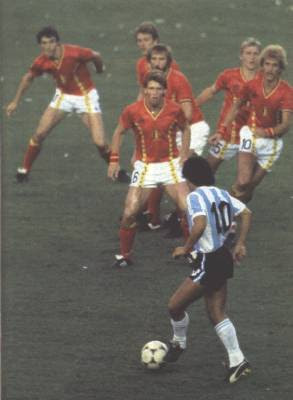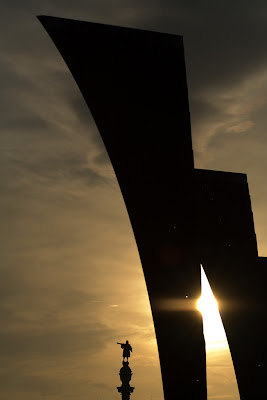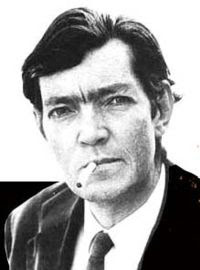
Over the last few days, I have been getting fewer sleep, less rest and more stress than usual. The reason has to be attributed rather to a tight schedule of pre-determined activities, than actual work. Which can be quite frustrating especially when you realize it is 7 pm and you are still at the lab without having have done anything useful apart from making a slide look nicer for a presentation everyone will forget ten minutes after they
enter the room. On the side of all this, the usual fanfare of meetings, talking to people about your work, more communicating than actually working. Over the years, I have slowly developed my own personal alerts for when this sort of situation becomes increasingly unbearable, the most alerting of which is an increasing frequency of tiny memory failures. I tend to think I -still- have quite a good memory, therefore being unable to recall the director of a film I saw two weeks ago or the name of a street in Barcelona becomes a sort of annoying if not warning that something has been cryptically occupying my precious neurons to an extent greater than what I should have allowed for. And it gets really disturbing when you combine it with a feeling that something does not really fit, that there is something there in front of your nose, the right result, nature winking at you and you simply cannot see it because you lack concentration.
During the past frustrating week, the only thing that kept me going through another attack of this fragmentary universe of demands was the thought that in the end of it all, at the end of this week, I could seek the tranquility I 've been longing for in the beauty of my favourite game. Euro 2008 starts in less than 6 hours and a month full of football sounds as reassuring for my tormented mind as his blanket was for Linus, or a teddy bear for a little child. In the case of the little child inside of me, my favourite toy is a football and my most subconscious urges lead me to connect it with practically everything. Therefore, upon facing a "sea of troubles", I could not help but remembering this beautiful photo, which used to hang from the wall of my student-years bedroom. Maradona controlling the ball with the interior of his supreme left foot, facing half of the Belgian national team in the semifinal of the World Cup in 1986. Against this "sea of defenders" he is calm. On the other hand, it is his aspiring "troubles" who look troubled, if not horrified. Needless to say, a bit after this shot was taken, Diego went through all six of them, or even more, scoring one of the greatest goals in the history of football. That was his way to get out of trouble back then. And even if he didn't manage that well with other sorts of trouble, (sneakier, less apparent and without the "fairytale"-like clarity of a football opponent) he still remains one of my greatest heroes.
I was thinking about that goal against Belgium, slightly under-rated, although in my humble opinion equally magnificent to the famous one against England in the quarter-final of the same tournament. Then, in one of my -frequent- breaks in front of my plots, I decided to look it up in youtube. I came up with this
video.Contrary to the usually sloppy, biased and unworthy goal compilations one may find in youtube, this one is probably the best I can think of. It goes on for 22 minutes with a selection of 50 legendary goals and although some are still missing I cannot but congratulate the compiler for making my Friday a bit more bearable. As the countdown from 50 to 1 was developing, my satisfaction was growing in a rather egocentric way, as I was realizing that simply by looking at the name of the player and before even the goal was broadcast, I could guess which would the goal be. So, I anticipated Dennis Bergkamp's sublime move round Dabizas in a match of Arsenal against Newcastle, I watched Maradona pierce the Belgian defense, Roberto Carlos swerving the ball to an unprecedented angle in "that free-kick" against France, I remembered a beautiful shot by Enter in the World Cup of 82 against the Soviet Union, which I have only seen on video. And then I saw once again what should be the simplest greatest goal of all time. Brazil's 4th in the final of the World Cup of 1970 against Italy.
It doesn't look like a great goal at first, the ball being passed around with the coolness and indifference of a friendly game. The score is 3-1 already and we are well into the final quarter. But as with great works of art, it takes sometime to appreciate the beauty of this one, as the whole team passes the ball around, the opponents retreating in fear of the calmness before the storm. Tostao wins the ball back on the left side line, passes to Piazza, Piazza to Clodoaldo. Clodoaldo makes fun of four Italians who commit the mistake to approach, passes to Rivelino, he stays on the left swerving the ball down the line to Jairzinho. Then a thunderous short run parallel to the box, passes to Pele and there you have it. The goal starts here. By the moment Pele receives the ball everything has been decided already. The Italian defense is out of balance, as the overload of Brazil's attack is forced on the left side. Pele has a space wide open to his right but doesn't make any move. He just stands there facing the goal with the ball at his feet. Carlos Alberto has started his run on the weak side, comes into the TV frame by the time the Italians can only stare at him, as he receives a seemingly meaningless pass by Pele. A perfect shot to the far post. 4-1.
A lot have been said about this goal, mostly having to do with Pele's blind pass. The great Brazilian, when repeatedly asked about it, always gave the same answer. "I did not seem him coming, I heard his footsteps." Arrogant by nature, Pele shares here a part of the truth. It's only natural that he could not have heard Carlos' footsteps in the tumult of 120.000 fans in the Azteka Stadium. However, he cannot but have thought that the natural course of things would be this. That the right back would make the run on the weak side to catch the defense off-guard. His pass is the simple proof that in football as in every human activity, there is a constant need for blending thought with intuition.
I was thinking about all this when I realized that perhaps this blending is what I have been lacking over this last frenetic weak. And that maybe I need to add a bit more of intuition in my thoughts, instead of simply weighing down my poor, limited memory with loads of information.
Or maybe I am doing it again, connecting football to practically everything.
 Then take me disappearin' through the smoke rings of my mind,
Then take me disappearin' through the smoke rings of my mind,



